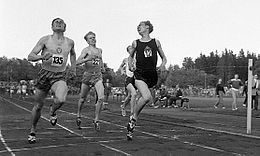1,500 metres
|
Athletics 1500 metres |
|
|---|---|

Olavi Salsola, Olavi Salonen and Olavi Vuorisalo (The three Olavis) break the 1,500 m world record in 1957 in Turku, Finland.
|
|
| Men's records | |
| World |
|
| Olympic |
|
| Women's records | |
| World |
|
| Olympic |
|
The 1500 metres or 1,500-metre run (approximately 15⁄16 mile) is the foremost middle distance track event in athletics. The distance has been contested at the Summer Olympics since 1896 and the World Championships in Athletics since 1983.
The demands of the race are similar to that of the 800 metres, but with a slightly higher emphasis on aerobic endurance and a slightly lower sprint speed requirement. The 1500 metre race is predominantly aerobic, but anaerobic conditioning is also required.
Each lap run during the world-record race run by Hicham El Guerrouj of Morocco in 1998 in Rome, Italy averaged just under 55 seconds (or under 13.8 seconds per 100 metres). 1,500 metres is three and three-quarter laps around a 400-metre track. During the 1970s and 1980s this race was dominated by British runners, along with an occasional Finn, American, or New Zealander, but through the 1990s a large number of African runners began to take over in being the masters of this race, with runners from Kenya, Morocco, and Algeria winning the Olympic gold medals.
In the Modern Olympic Games, the men's 1,500-metre race has been contested from the beginning, and at every Olympic Games since. The first winner, in 1896, was Edwin Flack of Australia, who also won the first gold medal in the 800-metre race. The women's 1,500-metre race was first added to the Summer Olympics in 1972, and the winner of the first gold medal was Lyudmila Bragina of the Soviet Union. During the Olympic Games of 1972 through 2008, the women's 1,500-metre race has been won by three Soviets plus one Russian, one Italian, one Romanian, one Briton, one Kenyan, and two Algerians. The 2012 Olympic results are still undecided as a result of multiple doping cases. The best women's times for the race were controversially set by Chinese runners, all set in the same race on just two dates 4 years apart at the Chinese National Games. At least one of those top Chinese athletes has admitted to being part of a doping program. The women's record was finally surpassed by Genzebe Dibaba of Ethiopia in 2015.
...
Wikipedia
